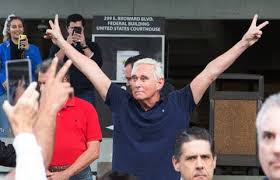
Tuesday
What are we to make of longtime Trump confidant Roger Stone’s flamboyant behavior following his arrest by Special Counselor Robert Mueller for lying to Congress about his contacts with Wikileaks? I think back to a passage from Herman Melville’s The Confidence Man that I applied to Trump during the campaign but which applies equally well to Stone.
Stone has always talked a big game, describing his self-confessed dirty tricks as performance art and asserting that “it’s better to be infamous than never be famous at all” and that “the only thing worse than being talked about is not being talked about.”
After federal agents descended upon Stone’s house last week, he first mimicked his hero Richard Nixon flashing the victory sign and then defiantly went onto multiple television shows vowing that he would never bear false witness against the president. He relished taunting Mueller’s investigation while at the same time signaling to the man who possesses the power to pardon him that he would remain loyal.
The Melville character I have in mind is a barber. Here’s how I applied the passage to Trump vs. Clinton:
The barber helps us understand how Trump makes his lies compelling, even getting at the way that Trump’s flamboyant hair gives him confidence. (The barber also gets at Trump’s underlying insecurity–without such hair, the barber says, a man is shamefaced and fearful.) We also learn why Clinton’s careful word choices damage her more than Trump’s “pants on fire” “four Pinocchios” fabrications. Responding to the question, “How does the mere handling of the outside of men’s heads lead you to distrust the inside of their hearts?”, the barber replies,
[C]an one be forever dealing in macassar oil, hair dyes, cosmetics, false moustaches, wigs, and toupees, and still believe that men are wholly what they look to be? What think you, sir, are a thoughtful barber’s reflections, when, behind a careful curtain, he shaves the thin, dead stubble off a head, and then dismisses it to the world, radiant in curling auburn? To contrast the shamefaced air behind the curtain, the fearful looking forward to being possibly discovered there by a prying acquaintance, with the cheerful assurance and challenging pride with which the same man steps forth again, a gay deception, into the street, while some honest, shock-headed fellow humbly gives him the wall!
Then he explains Clinton’s problem:
Ah, sir, they may talk of the courage of truth, but my trade teaches me that truth sometimes is sheepish. Lies, lies, sir, brave lies are the lions!”
So there you have it: Trump tells brave lies whereas Hillary engages in sheepish equivocations.
Stone, in short, is currently telling brave lies, which visually come across much more forcefully than the equivocations of other Trump confederates, such as Paul Manafort and Michael Cohen.
But will Stone keep it up? Can one maintain such a posture when one faces significant prison time. I think of Fagan, who maintains an imposing presence throughout Oliver Twist until a jury finds him guilty. At that point he remembers how people who are hanged suddenly transform “from strong and vigorous men to dangling heaps of clothes.”
Seasoned prosecutors predict that a comparable transformation lies ahead for Stone. We will see.

